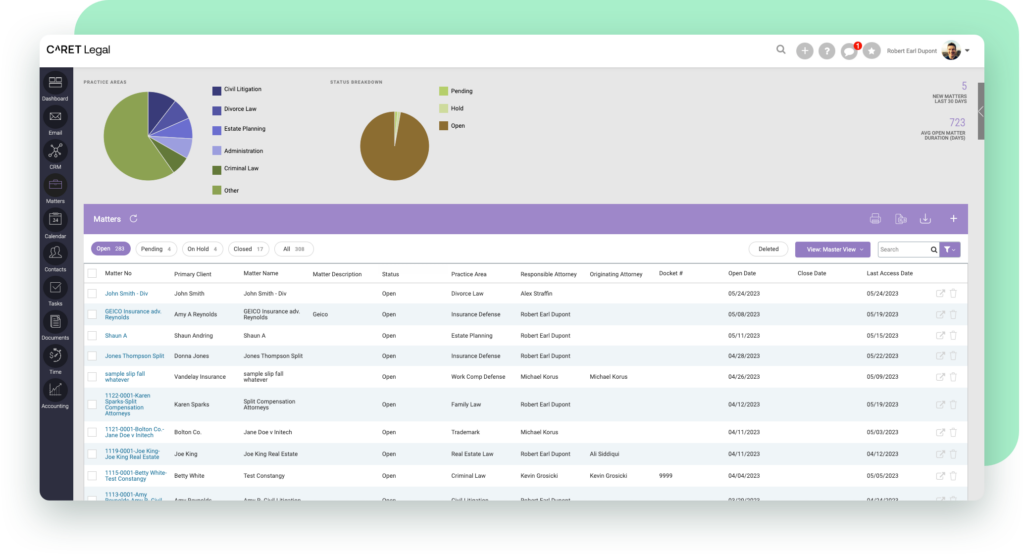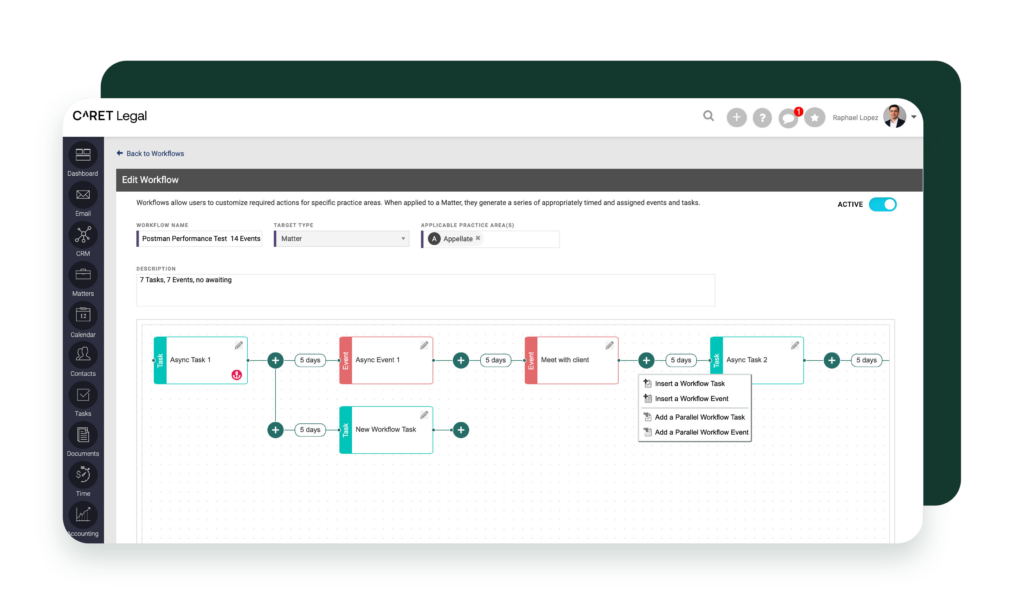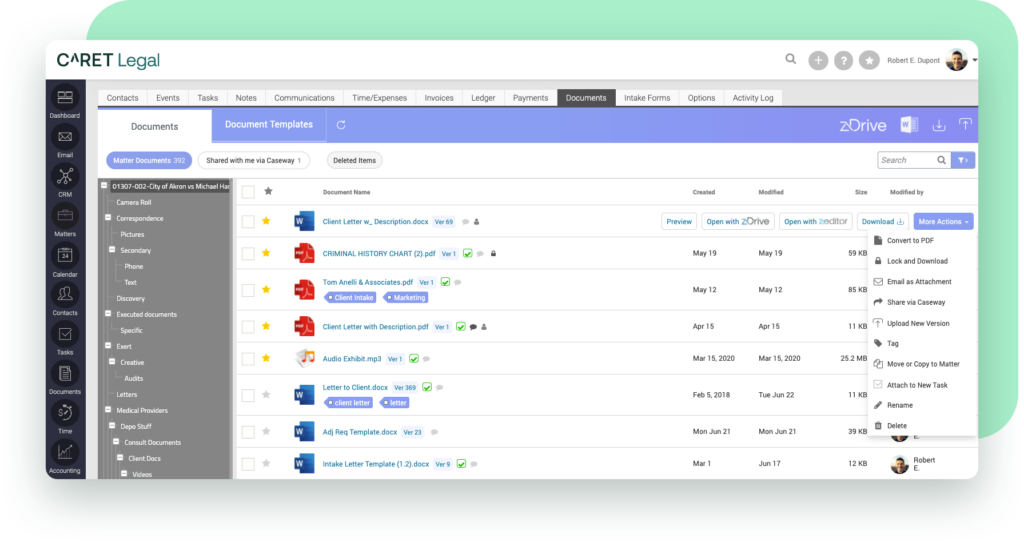Standardizing legal case management templates offers consistency, minimizes errors and optimizes workflows, leading to better productivity and accuracy.
Legal case management is a complex process that requires consistency and efficiency to ensure accuracy and productivity. In recent years, law firms have turned to templates and automation to streamline their workflows and minimize errors.
Since legal cases involve multiple parties, documents, and deadlines, it can be challenging to manage them effectively. Legal case management templates are designed to provide a framework for efficiently handling legal cases. Standardizing these legal templates offers consistency, minimizes errors and optimizes workflows, leading to better productivity and accuracy.

Track all of your cases and matters in one central location
Important Components of a Legal Case Management Template
A legal case management template should include essential components that play a vital role in managing cases effectively, such as:
- Case details: Provides a summary of the case, including parties involved, deadlines and case status. This helps team members stay informed about the case’s progress and ensure that all necessary information is readily available.
- Document management: Ensures that all documents related to the case have proper organization and easily accessible. It helps team members locate documents quickly and reduces the risk of losing important documents.
- Task management: Helps assign tasks to team members and track their progress. This ensures that all tasks are completed on time and that team members are held accountable for their responsibilities.
- Communication management: Ensures that all parties involved in the case are informed of any updates or changes. It helps team members communicate effectively and reduces the risk of miscommunication.
- Time tracking: Helps track billable hours and ensure that deadlines are met.
- Notes: Provides a space for team members to add any relevant information or updates. This ensures that all team members are aware of any changes or updates to the case.
Selecting a New Practice Management System
Download this guide to help you select the right technology for your firm, calculate the total cost of ownership, and understand data migration considerations before making a move.

Automating Legal Case Tracking
Automation in case tracking can significantly relieve administrative burdens and reduce errors in legal case management. By automating repetitive tasks such as document management, task management, and time tracking, firms can focus on more critical tasks such as legal research and client communication.
Automated workflows ensure consistency and productivity by standardizing the process and reducing the risk of errors. By standardizing the process, firms can ensure that all cases are handled in the same way, ensuring all team members are on the same page. This leads to better productivity and accuracy in handling legal cases.

Leave missed deadlines and forgotten tasks behind while unleashing the full potential of your firm
Implementing Legal Case Management Templates
Integrating legal case management templates into daily law firm operations requires careful planning and execution. Law firms should provide training to their team members on how to use the templates effectively. This training should include an overview of the template’s components, how to fill out each section, and how to customize the template to fit the specific needs of the case. Additionally, firms should ensure that all team members understand the importance of using templates and automated workflows to streamline workflows and minimize errors. By doing so, firms can ensure that all cases are handled consistently and efficiently.
Real-World Applications
Law firms can successfully implement legal case management templates by customizing them to their specific needs. For instance, firms can create related templates for different types of cases, such as personal injury, family law, or criminal law. They can also customize templates to include specific fields or sections that are relevant to their practice.
Firms can also use a legal case management template for client intake by creating a template that collects all necessary information from clients consistently and efficiently. This template can include fields for personal information and any additional questions related to specific practice areas.
By automating repetitive tasks such as document management, task management, and time tracking, law firms can focus on more critical tasks such as legal research and client communication.
Evaluating On-Premise and Cloud-Based Solutions Software Options
With the many legal practice management solutions out there, you must first decide whether you’re looking for an on-premise or cloud-based provider. With on-premise solutions, all of your firm’s data is stored locally while with cloud-based solutions, data is stored on a remote server. Cloud-based solutions are more feasible for teams that work remotely as your data can be accessed from anywhere with an internet connection.
Cost should also be considered when evaluating the two options. On-premise solutions require a significant upfront investment in hardware, software, and licensing fees, while cloud-based software is offered on a subscription basis as a “pay as you go” model with no software license purchase required. Maintenance required on an on-premise solution requires the firm to maintain and update the software and hardware which can be time-consuming and costly. Cloud-based software is maintained and updated by the software provider, reducing the burden on your firm’s IT department.
Additionally, cloud-based software is more scalable than on-premise software and can be easily upgraded or downgraded as needed. Increased needs of a growing firm require new hardware to be installed and configured on on-premise solutions.
Key Attributes of Effective Legal Case Management Software
Effective legal case management software is necessary for firms to manage cases efficiently and effectively, handling relevant details. The software should have key attributes that enable law firms to organize and track case-related information accurately:
- Client and matter management: allows firms to store and organize client information and case details. This helps firms manage cases effectively by providing a centralized location for all case-related information so firms can track case progress and deadlines.
- Time and expense recording: enables firms to track billable hours and expenses accurately. This helps firms manage their finances effectively by providing a clear picture of the costs associated with each case.
- Document management: allows firms to store and organize case-related documents securely. This ensures that all case-related documents are easily accessible and reduces the risk of losing important documents.
- Calendar scheduling: helps firms manage meetings and appointments effectively so you never miss an important deadline.
- Workflow automation: streamlines case management processes, reducing the risk of errors and delays.
- Data security: ensures that all case-related information is protected from unauthorized access, ensuring client confidentiality.

Easily store, manage, tag and edit files with a cloud-based document management system.
CARET Legal’s cloud-based legal practice management platform helps firms streamline workflows, ensures consistency and accuracy, minimizes errors caused by manual processes and enhances efficiency. Get started with a free trial or schedule a demo.
